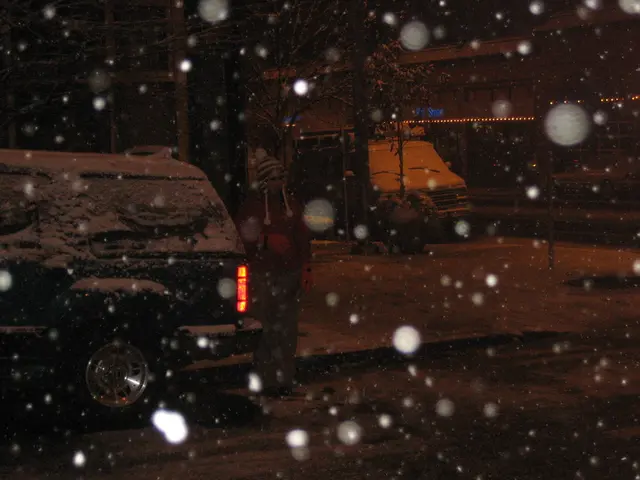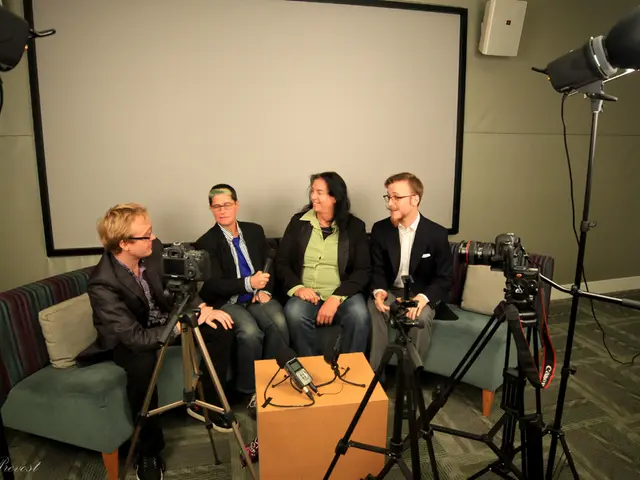Foreign film productions facing potential taxation by Donald Trump in Hollywood stir unease
Hollywood Tuzz over Trump's Proposed 100% Tariffs on Foreign Films:
A wave of doubt sweeps Hollywood over Donald Trump's proposed 100% tariffs on films produced outside the States, a move that many professionals and experts deem as ill-timed and harmful for the American audiovisual industry.
"Makes no sense," bellows Jonathan Handel to AFP. This keen-eyed lawyer highlights that numerous American productions, like the Bond series and Mission Impossible, are filmed abroad for creative reasons. "If Cruise is supposed to climb the Eiffel Tower, what's the alternative? Shoot it at a Vegas replica? That's ridiculous," he muses.
Market Turmoil
Trump announced on May 4th that his administration was initiating the process of imposing these heavy tariffs on foreign films screened in the U.S. This decision plunges the industry into uncertainty, with film studios seeing their stocks dropping, unions wrestling to comprehend this decision, and everyone questioning if it also affects series.
Hollywood in a Flap
Films are "intellectual property," reminds Handel. "You can't buy a movie ticket like you can a piece of clothing or a car," he explains. These tariffs, he predicts, "will do more harm than good." They would cut back on production, inflate movie costs, reduce films for cinemas and streaming platforms, ultimately damaging distribution.
The presidential proclamation has triggered crisis meetings in Hollywood, reports industry insiders. "Nothing but mayhem", opines a major American distributor to Deadline. "Let's hope this encourages American states to implement increased tax credits ASAP", he adds.
Re-location Trend
The Democratic governor of California seized this opportunity, proposing a federal plan worth $7.5 billion to aid the sector, in form of tax breaks. "California wants more filming action", said Gavin Newsom to the NY Times. Because if Trump's remedy is divisive, the diagnosis of a moribund American audiovisual production is unanimously agreed on.
Since the monumental strikes of actors and writers that crippled the industry in 2023, Hollywood has been fighting to recover. In LA, there's been a record-low number of shooting days in 2024, excluding the halt caused by the pandemic in 2020. This is due to the relocation of many productions to countries offering attractive tax incentives, such as Thailand, Hungary, or South Africa.
Australia, another incentive user, declared on May 6th through Foreign Minister Penny Wong that it still desired to create "great films" with the U.S. A Hollywood financier told Deadline that he concurred with Trump's objective but noted that "tariffs would choke the life out of the industry."
The White House clarified on May 7th that "no decision has been made" and that "the administration is considering all options." "I'm not trying to hurt the industry, I want to help it," Trump communicated to the press, promising a meeting with industry representatives soon.
Cautious Spirits
The studios have yet to respond. On the other hand, unions are adopting a cautious tone. SAG-AFTRA, the actors' union, "supports making more films, TV, and streaming content in the U.S." and is "eager to learn more."
"The U.S. needs a balanced federal response to bring film and television jobs back home," said IATSE, Hollywood's behind-the-scenes worker's union.
The proposed tariffs on foreign films by Donald Trump are causing alarm within the American audiovisual industry, with many questioning its feasibility and potential harm.
Jonathan Handel, a lawyer in the industry, points out that numerous American productions are filmed abroad for creative reasons, stating, "If Cruise is supposed to climb the Eiffel Tower, what's the alternative? Shoot it at a Vegas replica? That's ridiculous."







